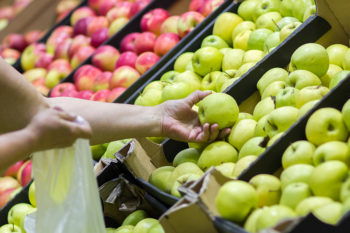Find out why plastic grocery pallets are the best choice for contaminant-free goods.

Millions of people rely on the grocery industry to provide fresh and nutritious food for themselves and their families. They place their trust in the safety of this food every day, and it’s important not to let them down. That’s why many growers and grocery retailers choose to transport food using reusable plastic pallets for their superior hygienic qualities, among other reasons like environmental benefits and cost reduction.
The hygienic benefits of plastic pallets for the grocery industry include:
- Prevent moisture buildup
- Resist contaminants
- Respond well to temperature changes
- Easy to clean and sanitize
- Can be used with hygienic plastic sleeves
- Stood the test of time
- Tracking and tracing compatibility
Continue to learn more about these benefits of plastic grocery pallets and why it’s the best option for perishable cold-chain goods like meat, eggs, milk, and produce.
Prevent moisture buildup
Water is a common co-pilot in cold chain transport. However, too much water – or water sitting for too long – can be bad for business. This problem of moisture buildup in-transit has long been a concern for many growers and grocers, and switching from wood to plastic pallets is one way to address it.
Wood pallets are a porous material that can absorb and hold water, which may raise the potential for increased microbial growth like mold, mildew, and bacteria in wood pallets. Sometimes, pallet suppliers will apply chemical treatments in an attempt to remove or prevent mold on wood pallets. Still, this process can introduce other potential problems like odors or concerns about these chemicals being too close to food.
Plastic pallets, on the other hand, do not absorb water. They lack the porosity that gives bacteria and mold an environment in which to thrive, so there is no need for chemical treatments. You can also take extra steps to prevent moisture buildup, including choosing plastic grocery pallets with optional leg drain holes to help funnel water away.
Resist contaminants
In addition to resisting mold and bacteria from too much moisture, plastic pallets also do not absorb harmful chemicals or spills during transport that can lead to contamination. Splinters that are common on rough or deteriorating wood pallets can compromise the integrity of the pallet and increase exposure to potential sources of contamination. The lower durability of wood pallets can also result in breakage or collapse during transport, ruining delicate produce or causing spills that may cross-contaminate other products. In contrast, plastic pallets maintain their strength and integrity after many uses and in virtually any environment, which helps preserve goods, prevent loss, and resist contaminants.
Respond well to temperature changes
The benefits of using an impermeable material like plastic for grocery pallets go beyond resistance to moisture and contaminants. There’s also the issue with material response in fluctuating temperatures. Moving pallets of products in and out of temperature-controlled areas creates condensation that may be absorbed by porous wood pallets. When this moisture freezes, it can cause the pallet to crack or swell. If damp wood pallets are left at room temperature after unloading, we’re back to the mold and bacteria problem. Conversely, plastic pallets do not change their composition in temperature changes, eliminating any susceptibility to temperature-led vulnerabilities.
Easy to clean and sanitize
Unlike wood pallets, plastic pallets for the grocery industry can be thoroughly cleaned with sanitization procedures that help keep food safe. In the RPA’s Guidelines and Best Practices for the Safe Use of Returnable Containers in Food Supply Chains, they outline simple yet comprehensive science-based protocols to properly wash plastic containers between uses.
Since wood pallets can’t be sanitized by traditional washing, they rely on applied chemical treatments that are absorbed into the wood. This process can introduce the possibility of these chemicals causing another set of problems, including breaking down into a harmful chemical that could affect sensitive foods. The ability to easily clean and sanitize plastic pallets is yet another hygienic benefit for cold-chain supply chains.
Can be used with hygienic plastic sleeves
For one more layer of protection, plastic pallets allow you to pack grocery products inside sleeve packs like these Big Pak® products that are available in twin sheet thermoformed or fluted plastic, both with locking options. This system introduces collapsible walls so you can store cold chain cargo in a fully enclosed container rather than having open sides. Plastic sleeves are popular in the grocery industry to help keep product in place and stave off microbes and other contaminants. Wood pallets do not offer this hygienic option.
Stood the test of time
Growers and retailers worldwide have trusted reusable packaging like plastic pallets for over 20 years. During that time, they’ve proven their safety and effectiveness without the sanitary downsides that wood can present. In addition to the hygienic differences of plastic vs. wood pallets, there are significant long-term cost benefits to grocers and other industries, as well. Head to our blog to learn more.
Tracking and tracing compatibility
To even further help protect perishable items in the cold food chain, plastic pallets are compatible with tracking and tracing technologies that can not only keep track of inventory, but also monitor the temperature of especially sensitive goods. This tracking and tracing compatibility with plastic pallets – not wood – allows grocers and retailers to optimize inventory management and ultimately keep food safer.
Because plastic pallets are trackable, traceable, and don’t absorb bacteria, chemicals, odors, or other contaminants the way their wood counterparts do, they are ideal candidates to keep food safe during its journey from farm to store and then dinner tables around the world. Get in touch with our team online or call 800.356.8150 to discuss the options for plastic grocery pallets for a safer, more hygienic load.
